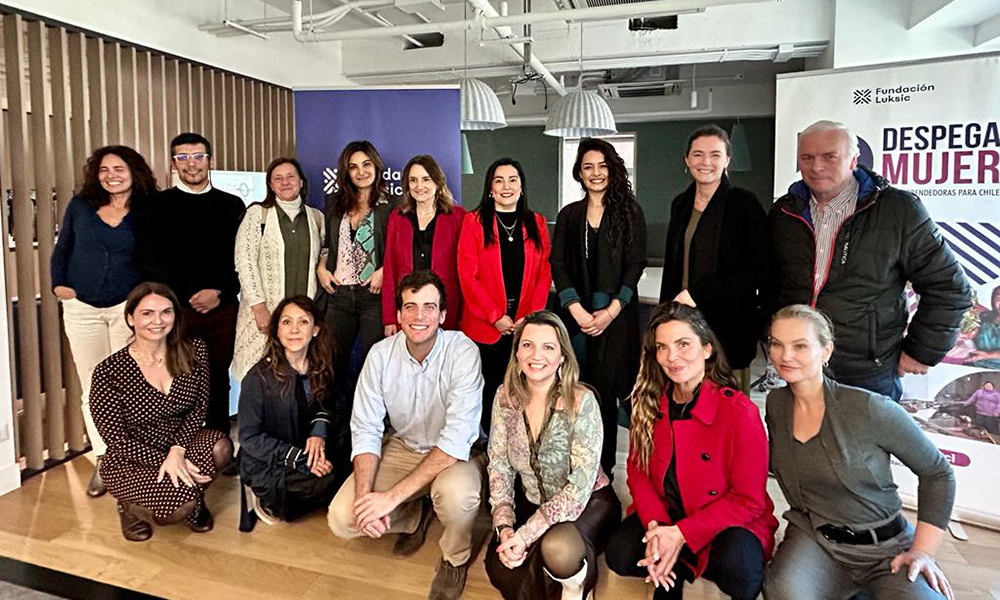According to the VII Microentrepreneurship Survey (2022), developed by the Ministry of Economy in conjunction with the INE, 41% of microentrepreneurs in Chile are women, which corresponds to more than 800 thousand entrepreneurs. What are the main barriers that these women face to grow their businesses, and how can these gaps be narrowed to promote female entrepreneurship? These are the questions that gave rise to the Luksic Foundation’s Despega Mujer program.
The initiative, which in 2023 is developing its fourth version, has supported 190 women entrepreneurs in nine regions of the country using a formula with a gender approach. “Through an initial diagnosis we were able to identify five barriers that hinder the growth of women-led entrepreneurship in Chile,” highlighted Cristián Schalper, the Foundation’s Director of Entrepreneurship.
These barriers consist of: family restrictions and the difficulty for many women to reconcile their businesses with their responsibilities at home; difficulty in accessing financing; low access to training; low knowledge of the use of technology; and low self-efficacy, understood as the self-confidence of women entrepreneurs to achieve what they set out to do.
“Based on this diagnosis, we implemented a comprehensive support program based on four pillars: financing, mentoring with experts, training and learning circles. Each element was developed to address one or more of the barriers detected,” said the Director of Entrepreneurship. These components have been developed in conjunction with Corporación Simón de Cirene and Corporación Construyendo Mis Sueños.
Elizabeth Huenupi, an entrepreneur from Cañete and participant in the second version of Despega Mujer, is one of the 190 entrepreneurs who have been boosted by this program: “Having been able to study and train was a great motivation on a personal level. I discovered that I didn’t have to stay only with face-to-face sales in my community. I started selling online and today I am reaching many regions with my clothes. For me that has been wonderful. I realized that my products are valued and I have everything in my hands to expand.
Sharing lessons learned
Throughout its four versions, the Luksic Foundation’s Evaluation and Development area has measured the results of this program. In order to share the main lessons learned and good practices to promote businesses led by women, the Luksic Foundation organized a discussion at the end of August with 13 public and private institutions from the women’s entrepreneurship ecosystem.
The institutions that participated were SERCOTEC, FOSIS, ASECH, Banco Estado, Corporación Simón de Cirene, Corporación Construyendo Mis Sueños, Fundación Banigualdad, Fondo Esperanza, ComunidadMujer, Mujeres Empresarias, Unión Emprendedora, Comunidad Mujeres Emprendedoras and Mujeres Influyentes.
Cecilia Schröder, general manager of SERCOTEC, said that the event “was a very interesting opportunity to talk with different institutions that work in the women’s business world and encourage collaboration. The important thing is that we all come together so that women’s entrepreneurship can grow, become formalized and more women can contribute to the economic growth of the country”.
Cecilia Schröder, general manager of SERCOTEC, said that the event “was a very interesting opportunity to talk with different institutions that work in the women’s business world and encourage collaboration. The important thing is that we all come together so that women’s entrepreneurship can grow, become formalized and more women can contribute to the economic growth of the country”.
For her part, Jessica Mahan, director of the Leadership Center of Comunidad Mujer pointed out that “today there is an important programmatic offer in relation to entrepreneurship and economic autonomy for women. The idea is that we can complement these efforts and these conversations help us to generate synergies between public, private and civil society organizations.
Despega Mujer already has two outcome evaluations and one implementation evaluation. Its findings have been compiled and published in a Policy Brief, available on the Luksic Foundation’s website.

